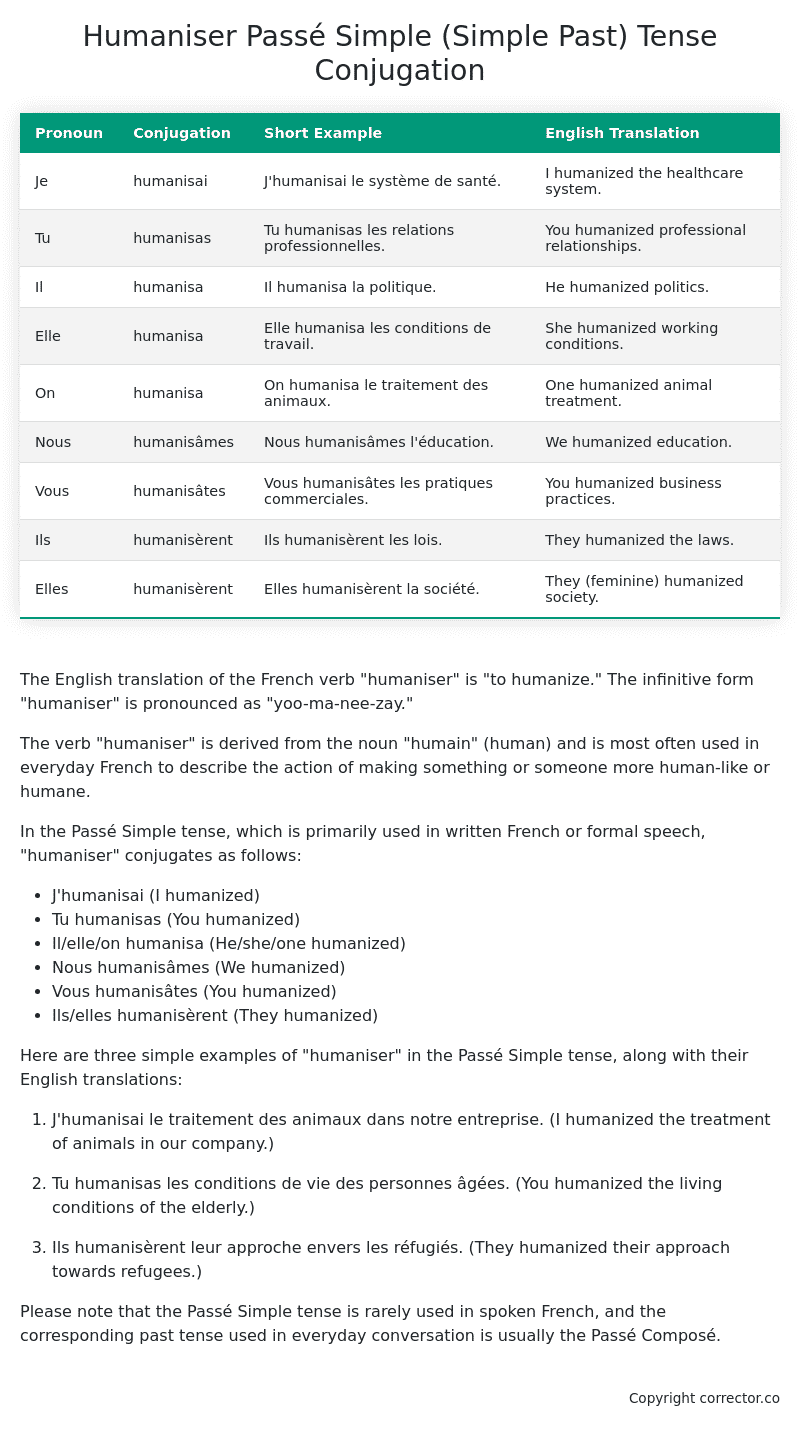Passé Simple (Simple Past) Tense Conjugation of the French Verb humaniser
Introduction to the verb humaniser
The English translation of the French verb “humaniser” is “to humanize.” The infinitive form “humaniser” is pronounced as “yoo-ma-nee-zay.”
The verb “humaniser” is derived from the noun “humain” (human) and is most often used in everyday French to describe the action of making something or someone more human-like or humane.
In the Passé Simple tense, which is primarily used in written French or formal speech, “humaniser” conjugates as follows:
- J’humanisai (I humanized)
- Tu humanisas (You humanized)
- Il/elle/on humanisa (He/she/one humanized)
- Nous humanisâmes (We humanized)
- Vous humanisâtes (You humanized)
- Ils/elles humanisèrent (They humanized)
Here are three simple examples of “humaniser” in the Passé Simple tense, along with their English translations:
-
J’humanisai le traitement des animaux dans notre entreprise.
(I humanized the treatment of animals in our company.) -
Tu humanisas les conditions de vie des personnes âgées.
(You humanized the living conditions of the elderly.) -
Ils humanisèrent leur approche envers les réfugiés.
(They humanized their approach towards refugees.)
Please note that the Passé Simple tense is rarely used in spoken French, and the corresponding past tense used in everyday conversation is usually the Passé Composé.
Table of the Passé Simple (Simple Past) Tense Conjugation of humaniser
| Pronoun | Conjugation | Short Example | English Translation |
|---|---|---|---|
| Je | humanisai | J’humanisai le système de santé. | I humanized the healthcare system. |
| Tu | humanisas | Tu humanisas les relations professionnelles. | You humanized professional relationships. |
| Il | humanisa | Il humanisa la politique. | He humanized politics. |
| Elle | humanisa | Elle humanisa les conditions de travail. | She humanized working conditions. |
| On | humanisa | On humanisa le traitement des animaux. | One humanized animal treatment. |
| Nous | humanisâmes | Nous humanisâmes l’éducation. | We humanized education. |
| Vous | humanisâtes | Vous humanisâtes les pratiques commerciales. | You humanized business practices. |
| Ils | humanisèrent | Ils humanisèrent les lois. | They humanized the laws. |
| Elles | humanisèrent | Elles humanisèrent la société. | They (feminine) humanized society. |
Other Conjugations for Humaniser.
Le Present (Present Tense) Conjugation of the French Verb humaniser
Imparfait (Imperfect) Tense Conjugation of the French Verb humaniser
Passé Simple (Simple Past) Tense Conjugation of the French Verb humaniser (You’re reading it right now!)
Passé Composé (Present Perfect) Tense Conjugation of the French Verb humaniser
Futur Simple (Simple Future) Tense Conjugation of the French Verb humaniser
Futur Proche (Near Future) Tense Conjugation of the French Verb humaniser
Plus-que-parfait (Pluperfect) Tense Conjugation of the French Verb humaniser
Passé Antérieur (Past Anterior) Tense Conjugation of the French Verb humaniser
Futur Antérieur (Future Anterior) Tense Conjugation of the French Verb humaniser
Subjonctif Présent (Subjunctive Present) Tense Conjugation of the French Verb humaniser
Subjonctif Passé (Subjunctive Past) Tense Conjugation of the French Verb humaniser
Subjonctif Imparfait (Subjunctive Imperfect) Tense Conjugation of the French Verb humaniser
Subjonctif Plus-que-parfait (Subjunctive Pluperfect) Tense Conjugation of the French Verb humaniser
Conditionnel Présent (Conditional Present) Tense Conjugation of the French Verb humaniser
Conditionnel Passé (Conditional Past) Tense Conjugation of the French Verb humaniser
Conditionnel Passé II (Conditional Past II) Tense Conjugation of the French Verb humaniser
L’impératif Présent (Imperative Present) Tense Conjugation of the French Verb humaniser
L’impératif Passé (Imperative Past) Tense Conjugation of the French Verb humaniser
L’infinitif Présent (Infinitive Present) Tense Conjugation of the French Verb humaniser
L’infinitif Passé (Infinitive Past) Tense Conjugation of the French Verb humaniser
Le Participe Présent (Present Participle) Tense Conjugation of the French Verb humaniser
Le Participe Passé (Past Participle) Tense Conjugation of the French Verb humaniser
Struggling with French verbs or the language in general? Why not use our free French Grammar Checker – no registration required!
Get a FREE Download Study Sheet of this Conjugation 🔥
Simply right click the image below, click “save image” and get your free reference for the humaniser Passé Simple tense conjugation!

Humaniser – About the French Passé Simple (Simple Past) Tense
Formation
Usage
Narration
Historical Context
Interactions with other tenses
Passé Composé
Imparfait
Conditional and Subjunctive
Summary
I hope you enjoyed this article on the verb humaniser. Still in a learning mood? Check out another TOTALLY random French verb conjugation!


